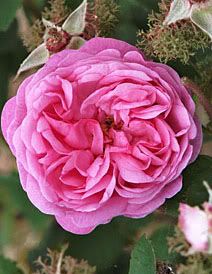 |
I wonder what the very modern (or modernist) Chanel, who said that a woman shouldn't smell like a rose but like a "woman," would make of my retort to the sales attendant (a woman) that rose (and lavender) are not old-fashioned?
And isn't the rose (in smell and metaphorically) the most "womanly" of all the flowers? What woman wouldn't want to smell, or look, like a rose, even secretly and privately?
Of course Chanel's contention is between the feminine being, and the woman. Feminine is weak and dependent (on men); woman is strong and independent, who can define, and redefine, herself. Or so Chanel thought.
As Mimifroufrou says in her article, perhaps Chanel did start this revolution against the rose and against femininity. Creating a synthetic perfume is like creating a "new woman," replete with all the characteristics that Chanel-the-creator (as she saw herself) would have liked her to possess. Perhaps she was the first pre-feminist (anti-female?), at the cusp of the feminist revolution (she made Chanel No.5, the anti-rose scent, in 1921); the first to negate, or downgrade, beauty and especially feminine beauty; the ancestor to our contemporary fashion designers and trend-setters, who like good students, are exchanging beauty with some other notion, like "hip" or "avant-garde," (or "modern" as Chanel might prefer), exclaiming that "beauty is irrelevant!" and that women shouldn't act like feminine beings, but instead like...what?
What would she make of the Return of the Rose, albeit in modest, but very successful, scents like The Body Shop's Moroccan Rose, and the trend continuing in the more upscale variatons?
How strong the rose is! It (or its destruction) is emblematic of a whole revolution - the feminist revolution. But look at how its making a comeback